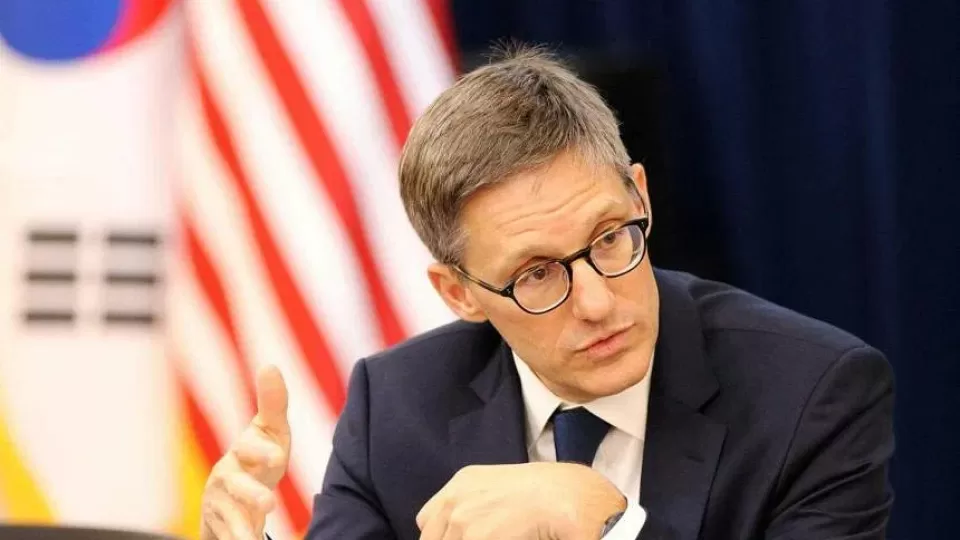April 17, 2023
SINGAPORE – China is rebuffing attempts by the United States to restart dialogue after tensions between the two nations escalated recently.
Beijing is simply not returning calls from the Americans, a senior US diplomat told The Sunday Times in an interview on Friday while on a two-day trip to Singapore.
“Overtures had been made by us to have engagements with them, they have not taken up on those overtures,” said Mr Derek Chollet, the US State Department Counsellor.
Tensions rose after the US downed a Chinese “spy” balloon hovering over its skies in February. Calling the incident a violation of sovereignty and international law, US Secretary of State Antony Blinken indefinitely postponed his planned meeting with President Xi Jinping in Beijing.
China maintains the balloon was merely gathering weather data.
Beijing has reportedly spurned repeated requests for engagement since then, including from US Defence Secretary Lloyd Austin.
There could be a breakthrough in Singapore if he meets his counterpart Li Shangfu, the new defence minister, at the Shangri-La Dialogue in June.
Their participation, however, remains to be confirmed.
The Dialogue, an annual meeting of the world’s top security officials and organised by the International Institute for Strategic Studies in Singapore since 2002, was the venue for the first in-person meeting between Mr Austin and his then counterpart Wei Fenghe in 2022, when they presented competing strategic visions.
“There is no question that the relationship with the PRC (People’s Republic of China) has been at a tense moment,” Mr Chollet said, adding: “We feel the responsibility to manage this relationship responsibly.”
He said the US is sensitive to the disquiet over testy US-China ties being experienced in South-east Asia, which he describes as an “arena where strategically the 21st century will increasingly be defined”.
“We are very much open and seeking continued dialogue. And we hear from our friends in the region the importance that they place on us finding a way to be able to coexist with the PRC.
“And in a way that we don’t take acts that are escalatory and seek to de-escalate situations,” added Mr Chollet, a senior policy adviser to Mr Blinken.
“We want to make it clear to our partners; it was what I was talking to colleagues about here (in Singapore),” he said.
He met Foreign Minister Vivian Balakrishnan and Permanent Secretary for Foreign Affairs Albert Chua, among other officials, on Friday before flying to South Korea on Saturday.
Mr Chollet said he also sought perspectives on the US-China relationship from counterparts in Jakarta and Bangkok during his visits in March.
“We recognise that a big part of succeeding here is being present, listening and engaging.”
Talks are also a matter of urgency because the US senses that China is “bristling” at the current world order and is capable of overhauling it.
China has emerged after the pandemic-era isolation with several diplomatic forays that hit the headlines, including Mr Xi’s reaffirmation of ties with Moscow, a proposal to end the war in Ukraine and brokering a Saudi Arabia-Iran rapprochement.
After meeting Mr Xi last week, French President Emmanuel Macron said Europe should steer clear of any potential conflict between the superpowers.
Brazilian President Luiz Inacio Lula da Silva, on a trip to China this week, said the dominance of the US dollar and Western financial institutions should end.
Analysts seize on these developments as evidence of China’s desire to replace the US at the head of the world order that was minted when it was a less powerful nation after World War II.
It is clear that China “is increasingly bristling at an order that it sees as unfair to itself”, said Mr Chollet. “Even though, of course, that very order is the reason why the PRC has been able to have tremendous economic and social growth over the last several decades.”
“But we believe in dialogue and discussion. They should be able to present their views, we will present our views and try to forge a way forward. We don’t shirk from that, we are not shy,” he added.
“But it is not happening, and I think it is a question better placed to them on why not,” he said, underlining China’s lack of urgency in resuming talks.
Elements of a new Cold War – ideological contest, military confrontation and economic separation – appear to have taken hold in bilateral ties, although trade hit a record high in 2022.
But Mr Chollet said what is afoot is a “de-risking” that arose from the US’ wish to keep its supply chains resilient and ensure it is not reliant on China for components of key technologies.
“We certainly do not seek a new Cold War. Nor are we seeking to decouple from China. There is a certain amount of de-risking that is going on,” he said.
“It is the most complex and consequential relationship that we have. We have to accept that China is the only country with both the power and the will to try to remake the world order.”
But while that rivalry plays out, the US appears not to mind that South-east Asian economies are keen to preserve ties with both the US and China – a predominant source of trade, investment, infrastructure and technology – and are vocal about not being asked to choose sides.
“Well, we hear it, and we have tried to be responsive to it,” Mr Chollet said, adding that the US is being watchful to ensure China plays by the rules and does not advance projects that are debt traps.
“Also, it is important to say we are not alone in this. This is something that our partners here in the region and elsewhere around the world, including Europe, are also very cognisant of,” he noted.
Mr Chollet, an advocate of American leadership, has long stressed working with partners. His task is not getting any easier.


